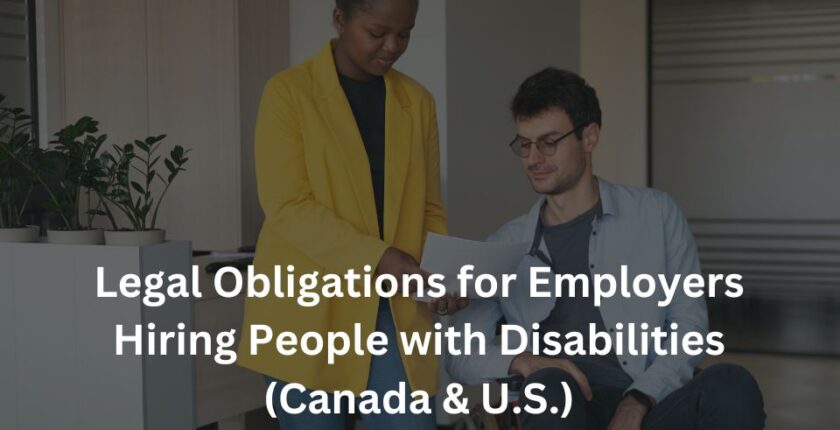Legal Obligations for Employers Hiring People with Disabilities (Canada & U.S.)
Creating an inclusive and accessible workplace isn’t just good business practice—it’s the law. Both Canada and the United States have strong legal frameworks in place to ensure that individuals with disabilities are treated fairly during the hiring process and throughout their employment.
In this guide, we’ll break down the key disability hiring laws, outline employer responsibilities, and provide tips for compliance and inclusive hiring.
Why Disability Inclusion Matters
Beyond meeting legal requirements, inclusive hiring:
- Increases workforce diversity
- Fosters innovation and collaboration
- Enhances brand reputation
- Expands your talent pool
Understanding your legal obligations helps ensure you’re not only compliant—but also committed to equitable hiring practices.
🇺🇸 United States: Americans with Disabilities Act (ADA)
Overview of the ADA: The Americans with Disabilities Act (ADA) is a federal law passed in 1990 that prohibits discrimination against individuals with disabilities in all areas of public life—including employment.
Who Must Comply?
- Private employers with 15 or more employees
- State and local governments
- Employment agencies
- Labor unions
Key Employer Responsibilities Under the ADA
- Non-Discrimination in Hiring
- Employers must not refuse to hire a qualified individual because of a disability.
- Job applications, interviews, and assessments must be accessible.
2. Reasonable Accommodations
Employers must provide reasonable accommodations (unless it causes undue hardship), such as:
- Modified work schedules
- Screen readers or adaptive software
- Physical access adjustments
3. Confidentiality
Employers must keep medical information confidential, even after hiring.
4. Job Descriptions Must Reflect Essential Functions
Employers should clearly define the essential functions of a role to fairly assess qualified candidates.
🇨🇦 Canada: Accessible Canada Act & Provincial Laws
Accessible Canada Act (ACA) The Accessible Canada Act, passed in 2019, is a federal law designed to create a barrier-free Canada by 2040. It applies to federally regulated industries, such as:
- Banking
- Telecommunications
- Transportation
- Federal government agencies
Key Employer Responsibilities Under the ACA
Accessibility Plans: Employers must develop and publish accessibility plans, update them every 3 years, and consult with people with disabilities.
Barrier Identification and Removal: Employers are required to actively identify, remove, and prevent barriers to employment.
Feedback Mechanisms: Must establish ways for employees and job seekers to provide anonymous accessibility-related feedback.
Provincial Laws You Must Know
In addition to the ACA, each province has its own accessibility laws. Examples include:
- Ontario – Accessibility for Ontarians with Disabilities Act (AODA)
- British Columbia – Accessible BC Act
- Manitoba – Accessibility for Manitobans Act
These laws often require:
- Accessibility training for staff
- Accommodation policies
- Inclusive recruitment practices
Best Practices for Employers
Even if you meet the minimum legal requirements, going beyond compliance sets you apart as a truly inclusive employer. Here’s how:
Audit Your Hiring Process: Ensure your job ads, career page, and interview processes are accessible.
Provide Clear Accommodation Policies: Make it easy for candidates to request accommodations—include instructions in job postings.
Train Hiring Managers: Provide regular training on disability hiring laws, unconscious bias, and inclusive interviewing.
Use Accessible Job Boards: Post on platforms like DisabilityJobBoard.net, which connect you with qualified candidates seeking inclusive employers.
Create a Culture of Inclusion: Foster open dialogue, celebrate diversity, and support long-term accessibility improvements.
Penalties for Non-Compliance
Ignoring your legal responsibilities can lead to:
- Lawsuits and legal claims
- Fines or penalties
- Reputation damage
- Loss of government contracts
In both the U.S. and Canada, regulatory agencies like the EEOC (U.S.) and Canadian Human Rights Commission may investigate and enforce actions against non-compliant employers.
Final Thoughts
Inclusive hiring isn’t just a checkbox—it’s a commitment to fairness, accessibility, and opportunity for all. By understanding your legal obligations and embracing best practices, you not only protect your business but also help build a more equitable workforce.
Let platforms like DisabilityJobBoard.net help you connect with skilled, motivated candidates who are ready to contribute and grow—when given the opportunity.


